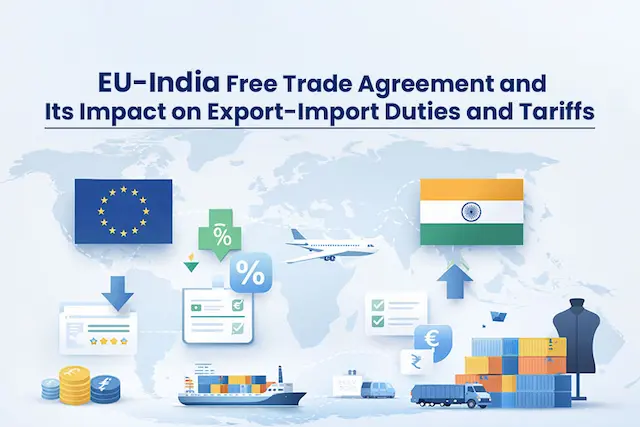India stands proudly among the world’s top 20 exporting countries, boasting numerous billion-dollar companies consistently listed in Forbes’ top 2000. These leading Indian exporters have deftly risen above fierce global competition through smart strategies and unique qualities. They’ve achieved their prominence through innovation, efficient supply chain management, and a relentless pursuit of customer satisfaction.
What sets them apart is their ability to understand market dynamics and adapt quickly. With visionary leadership at the helm, they’ve navigated challenges with resilience, securing their positions as industry leaders. These companies exemplify the power of determination and strategic thinking in achieving success on the global stage. So in this blog, let’s get to know 3 top exporting companies in India from close and unfold what makes them successful. Keep reading!
Also Read: What is Factoring in Finance and How Does It Work?
Exploring India’s Top 3 Exporters: What Sets Them Apart?
Dive into the notable qualities that distinguish India’s leading exporters from the rest in the global market landscape.
Reliance Industries: Transforming Challenges into Mango Export Success
Reliance Industries, a household name in India, is renowned for its contributions to the petroleum and telecom sectors. However, its influence extends far beyond these realms. Surprisingly, Reliance plays a significant role in the export industry, accounting for 15% of India’s total exports through its oil and gas ventures. With a broad international clientele spanning Europe, Africa, and America, Reliance stands as a key player in India’s export landscape.
Yet, there’s a lesser-known aspect to Reliance’s operations that underscores its innovative spirit. Nestled within its vast empire lies Dhirubhai Ambani Lakhibag Amrayee, Asia’s largest mango orchard. This orchard boasts an impressive array of 127 mango varieties, including beloved Indian favorites like Kesar, Alphonso, and Ratna, as well as foreign varieties like Tommy Atkins and Kent. Reliance’s foray into mango cultivation was not merely a whimsical venture but a strategic response to challenges faced by its Jamnagar refinery, the world’s largest.
In 1997, the refinery encountered environmental concerns flagged by pollution control boards. In a stroke of ingenious problem-solving, Reliance transformed the wastelands surrounding the refinery into a sprawling mango orchard. Over 1.3 lakh mango plants representing 200 species were meticulously planted across 600 acres of land. However, this ambitious endeavor was not without its hurdles. The orchard grappled with water scarcity and arid soil conditions, posing significant challenges to cultivation.
Undeterred, Reliance leveraged modern solutions such as drip irrigation, water harvesting, and simultaneous fertilization to overcome these obstacles. Additionally, the company implemented innovative measures like a desalination plant to ensure a sustainable water supply for the green belt. What initially appeared as a threat to the refinery’s operations ultimately became a testament to Reliance’s adaptability and forward-thinking approach.
Today, the mango orchard stands as a symbol of Reliance’s commitment to sustainability and diversification. Beyond its core industries, Reliance Industries’ venture into mango cultivation exemplifies its ability to transform challenges into opportunities. This blend of innovation, strategic thinking, and environmental stewardship underscores Reliance’s position as one of India’s foremost export companies, earning it a well-deserved spot among the nation’s top exporters.
Tata Motors: The Remarkable Resurgence in the Indian Market
Tata Motors, a pivotal player in India’s automotive industry, has long been synonymous with reliability and innovation. However, in the mid-2000s, the company faced significant challenges as competitors like Hyundai and Maruti Suzuki surged ahead in the market. Despite being a top export company in India, Tata Motors found itself falling behind domestically. Nevertheless, the company orchestrated a remarkable turnaround, spearheading its resurgence in the Indian market.
Established in 1868, Tata Group has been an integral part of Indian households, evolving into the largest conglomerate in the country. In 1998, Tata Motors ventured into the automotive sector with the launch of the popular “Indica Hatchback.” Initially, the trajectory seemed promising, but by 2005, intensified competition posed formidable obstacles for Tata Motors.
Amidst this adversity, Tata Motors undertook a strategic overhaul to reclaim its position in the Indian automotive landscape. In 2016, the introduction of the Tata Tiago marked a significant milestone in the company’s journey. Characterized by meticulous design and engineering, the Tiago captured the attention of consumers, even eliciting comparisons to foreign counterparts.
The success of the Tiago can be attributed to Tata Motors’ commitment to innovation and customer-centricity. Recognizing the evolving preferences of consumers, the company revamped its production processes to deliver modern and futuristic vehicles. By prioritizing quality and features, Tata Motors elevated the standard of its offerings, surpassing industry benchmarks.
Crucially, Tata Motors astutely addressed changing market dynamics by transitioning from diesel to petrol variants and introducing advanced transmission options, including Automated Manual Transmission (AMT). This strategic pivot not only aligned with environmental considerations but also catered to shifting consumer preferences, enhancing the appeal of Tata vehicles.
Moreover, Tata Motors’ embrace of change and innovation underscores its resilience and adaptability. Rather than resting on past laurels, the company embraced transformation, resulting in the development of globally renowned designs and technologies.
In conclusion, Tata Motors’ resurgence in the Indian market exemplifies its unwavering commitment to excellence and reinvention. Through strategic initiatives, relentless innovation, and customer-centricity, Tata Motors has not only reclaimed its position but also set new standards for the automotive industry. As a beacon of Indian ingenuity and enterprise, Tata Motors continues to shape the future of mobility, both domestically and globally.
Sun Pharma: A Journey from Humble Beginnings to Pharmaceutical Dominance
Imagine a pharmaceutical giant that began its journey with just five workers and five products. It sounds improbable, but that’s the remarkable story of Sun Pharma, a leading player in the global pharmaceutical industry and one of the top export companies in India. Let’s delve into the fascinating narrative of Sun Pharma’s rise to greatness.
In 1983, Dilip Shanghvi laid the foundation of Sun Pharma with a modest start, focusing on psychiatry ailments with a handful of products. Despite its humble beginnings, the company demonstrated unwavering determination and a commitment to excellence. As time progressed, Sun Pharma expanded its product portfolio, venturing into new therapeutic areas. Cardiology products were introduced in 1985, followed by gastroenterology products in 1989, marking significant milestones in the company’s evolution.
However, Sun Pharma’s ascent to prominence truly accelerated in 2014 with the acquisition of Ranbaxy, a pivotal move that catapulted the company to the forefront of the pharmaceutical landscape. This strategic acquisition not only expanded Sun Pharma’s market reach but also reinforced its position as the largest Indian pharmaceutical company in the United States. With 30% of its turnover emanating from the American market, Sun Pharma solidified its global footprint, with an impressive 72% of sales originating from international markets.
Today, Sun Pharma stands as a towering presence in the pharmaceutical arena, dominating various therapeutic segments including orthopedics, dermatology, vitamins, minerals, nutrients, diabetology, and urology. Its products are revered by healthcare professionals, with several specialties of doctors ranking Sun Pharma prescriptions as their top choice in India.
The success story of Sun Pharma underscores the significance of consistency and perseverance in the pharmaceutical export industry. Despite humble beginnings, the company’s steadfast commitment to innovation, quality, and global expansion has propelled it to unparalleled heights of success. Sun Pharma’s journey serves as a testament to the transformative power of dedication and strategic vision in navigating the complexities of the pharmaceutical landscape.
Moreover, Sun Pharma’s trajectory exemplifies the potential for Indian enterprises to compete and excel on the global stage. By leveraging its strengths and seizing strategic opportunities, Sun Pharma has not only carved a niche for itself but has also emerged as a beacon of excellence within the pharmaceutical domain.
In conclusion, Sun Pharma’s remarkable ascent from modest origins to pharmaceutical dominance epitomizes the spirit of entrepreneurship and resilience. Through visionary leadership, strategic acquisitions, and a relentless pursuit of excellence, Sun Pharma has etched its name among the elite ranks of the global pharmaceutical industry. As a trailblazer in innovation and quality, Sun Pharma continues to inspire and shape the future of healthcare, both in India and beyond.
Decoding Success: 10 Traits That Define India’s Top Exporters
Explore the key attributes that distinguish India’s leading exporters, from innovation and adaptability to global outlook and commitment to excellence.
Innovation: Each of these companies demonstrates a commitment to innovation, whether it’s Reliance Industries turning challenges into opportunities through mango cultivation, Tata Motors revolutionizing its production processes, or Sun Pharma’s relentless pursuit of new therapeutic solutions.
Adaptability: Reliance Industries, Tata Motors, and Sun Pharma showcase remarkable adaptability, adjusting their strategies and operations to navigate changing market dynamics and emerging challenges.
Diversification: These companies have diversified their business portfolios beyond their core industries, expanding into new sectors or product lines to mitigate risks and capitalize on opportunities, as seen in Reliance’s mango orchard, Tata Motors’ introduction of new vehicle models, and Sun Pharma’s expansion into various therapeutic segments.
Strategic Acquisitions: Sun Pharma’s acquisition of Ranbaxy and Reliance Industries’ expansion into telecom through Jio are examples of strategic acquisitions that have bolstered their market presence and propelled their growth.
Global Outlook: All three companies have a strong global presence, with significant portions of their revenue coming from international markets, reflecting their global ambitions and competitiveness.
Customer-Centric Approach: Tata Motors’ focus on developing vehicles with advanced features and Sun Pharma’s commitment to producing high-quality pharmaceuticals tailored to meet diverse medical needs highlight a customer-centric approach that prioritizes consumer satisfaction.
Environmental Stewardship: Reliance Industries’ innovative use of wastelands for mango cultivation, coupled with sustainable practices like drip irrigation and water harvesting, underscores a commitment to environmental stewardship and sustainability.
Resilience: Despite facing challenges, these companies have demonstrated resilience and the ability to overcome obstacles, whether it’s Tata Motors’ turnaround from a period of stagnation or Sun Pharma’s journey from humble beginnings to pharmaceutical dominance.
Strategic Vision: Each company exhibits a strategic vision that guides its long-term growth and development, evidenced by Reliance Industries’ expansion into diverse sectors, Tata Motors’ focus on innovation and quality, and Sun Pharma’s pursuit of global leadership in the pharmaceutical industry.
Commitment to Excellence: Finally, all three companies share a common commitment to excellence in their respective fields, reflected in their products, services, and overall business practices, which have earned them recognition as leaders in their industries.
Final Note
The success stories of Reliance Industries, Tata Motors, and Sun Pharma serve as powerful examples of Indian ingenuity, resilience, and global competitiveness. Through innovation, adaptability, strategic vision, and a customer-centric approach, these companies have not only risen to prominence in their respective industries but have also made significant contributions to India’s export prowess.
Their commitment to excellence, environmental stewardship, and relentless pursuit of growth have positioned them as leaders on the global stage, inspiring countless others and reaffirming India’s status as a powerhouse in international trade. As they continue to evolve and expand, their stories will undoubtedly inspire future generations of entrepreneurs and exporters to strive for excellence and make their mark on the world.
Also Read: A Brief Guide to Non-Recourse Factoring




